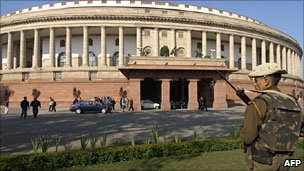Why do India's MPs love guns?
- Published
- comments

India's MPs are given protection - why do so many need guns?
Why do so many Indian parliamentarians need guns?
And why are guns being sold to MPs who have criminal cases pending against them?
Nobody quite knows. But the government's reply to a freedom of information request on gun ownership among MPs has revealed some startling facts:
756 guns were sold to MPs and VIPs - usually politicians - in India between 1987 and 2012.
82 MPs purchased guns being sold off by the state between 2001 and 2012.
18 of these 82 MPs have criminal cases pending against them. They include charges of murder, attempt to murder and kidnapping.
One of these MPs - Atiq Ahmed from Uttar Pradesh - has 44 criminal cases pending against him.
These mostly imported guns were seized by customs and then sold to MPs - at well below the market price until a few years ago.
Curiously, only MPs can buy these confiscated weapons. Ordinary citizens, according to the watchdog Association for Democratic Reforms, are not eligible even if they have firearms licences.
the watchdog raises some pointed questions.
Why should guns be sold only to MPs when many of them already enjoy police protection at state expense?
Why are guns being sold to MPs who have "serious criminal charges" pending against them?
Why are ordinary citizens not eligible to buy these guns?
Does the government track the possession of these guns to check if they have been sold off on the black market?
The government and the MPs have no answers yet.
Right to information activist Ambrish Pandey, who unearthed the information, believes the sale of guns to MPs is a result of an "ad hoc, discretionary and opaque policy of allotment".
India's democracy is already facing a serious challenge from criminalisation of politics.
Nearly a third of MPs - 158 out of 543, to be precise - in the lower house face criminal charges in more than 500 cases.
Seventy-four of them face very serious charges, such as murder and abduction.
And now we find that the government has freely sold guns to many of them. What is happening?